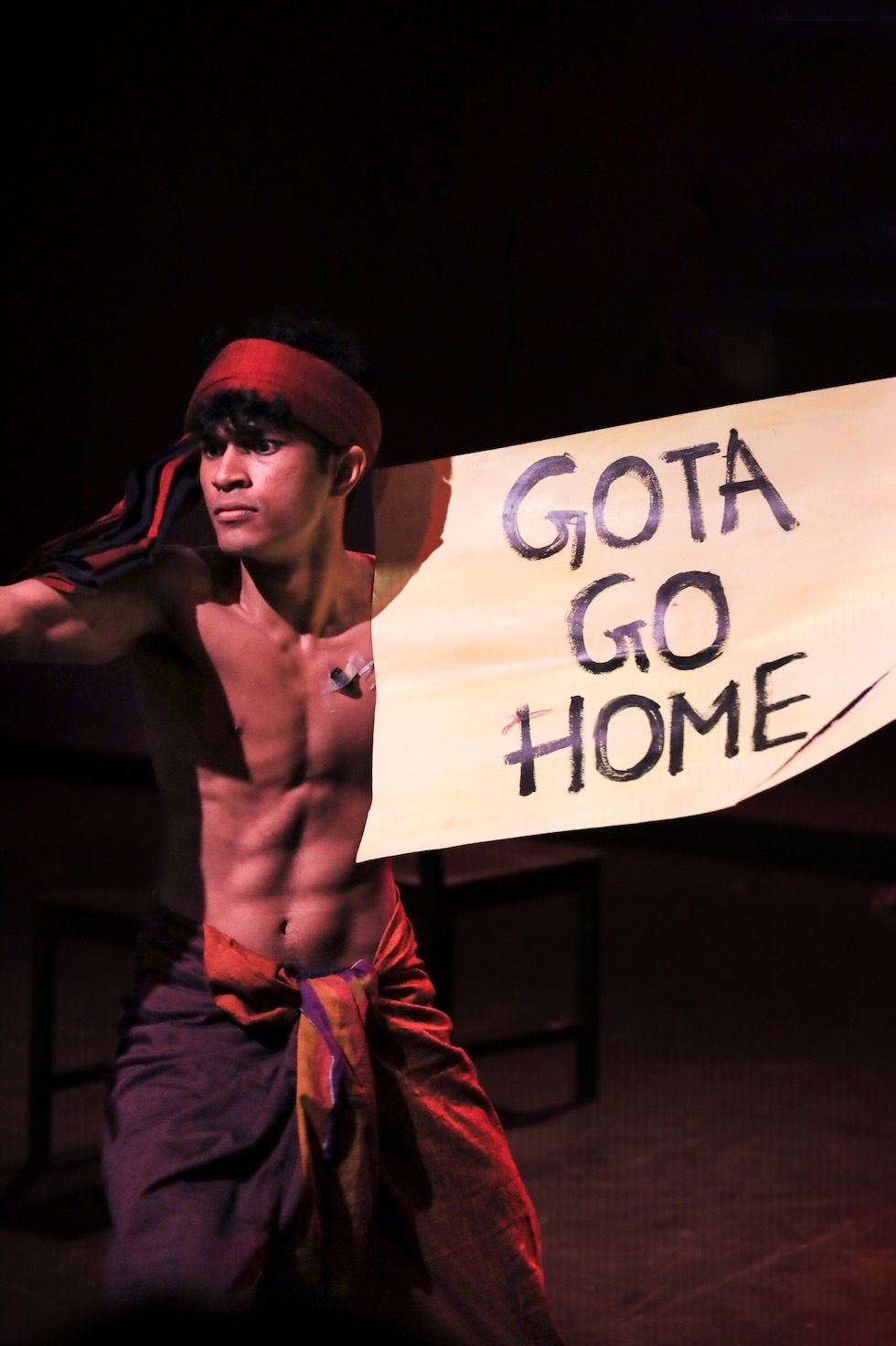Last Saturday, the Nitery Theatre hosted the one-person theater performance “GROWTHesque,” where Leeth Singhage ’26 portrayed SarongHoodie (nicknamed Shroodie), a teenager in Sri Lanka growing up amidst failing government, hyperinflation and public protests. The audience followed Shroodie as he finds courage in performance arts during the coronavirus lockdown in 2022 and reckons with the anxieties around his homeland’s socio-political instability.
Singhage wrote “GROWTHesque,” a solo play interlaced with choreography and musical numbers, for the Edinburgh Fringe Festival in 2022 and premiered it there. It has since been performed at the United Solo Theater Festival in New York City, where Singhage was awarded “Best Emerging Actor.” Now, as part of the Developmental Stage of Stanford’s Asian American Theater Project (AATP), the show was revitalized for Stanford audiences for the weekend.
Singhage is an international student from Sri Lanka. The show chronicles Singhage’s journey as an artist in high school at a time when there were no sites for performances. Intertwined with his coming-of-age story was the reality of Sri Lanka’s major recession in 2022. The country defaulted on its international debt, sending the economy into hyperinflation and triggering mass protests. With two chairs, a sarong, a hoodie and a projector screen, Singhage captivated audiences through his powerful performance.
“GROWTHesque” reminds me that art has the potential to provide a temporary regenerative space, as we navigate paths towards better homes and societies. It can inspire us to be more critical about the status quo and elucidate our complicity in them.
In fact, the show emerged as a response to drastic changes that Sri Lanka underwent over the last year. “I initially applied to the Edinburgh Fringe Festival with a different play,” said Singhage. However, during preparation for the show, Sri Lanka started going into an economic crisis. Singhage then realized that there “was a more important story to be told.”
Working closely with Nishantha de Silva, a Sri Lankan dramaturg, Singhage wrote about what was going on in Sri Lanka. “Every single week, things changed,” reflected Singhage. From new presidents, to exams being canceled, to days-long queues for fuel amidst electricity cuts, he said that the script was “always being rewritten, because things are changing all the time.” The script was finalized a week before the performance in Edinburgh.
At the beginning of the show, Shroodie is stuck in all-too-familiar Zoom classes, self-learning biology A-levels as he works toward medical school to satisfy his father. He and his friends find themselves questioning the meaning of adulthood and questioning whether they should conform to a narrow definition of success against the backdrop of the failing nation-state.
In the one-person show, Singhage embodied different characters in caricatured manners, switching his body language, tone and accents to fill the audience’s imagination. One personality that stood out was the painfully humorous portrait of his dad: snarky, stern and dismissive of acting.
Similarly, his portrayal of Shanaya — a neurotic, hyper-intelligent caricature of his lesbian friend — gave the audience a lot of context to the Sri Lankan youth’s attitude towards the unfolding political turmoil; both view the recession as a symptom of the crumbling democracy. She compares the then-government to a monkey, likening the failing government in Sri Lanka to “Planet of the Apes”
The show was incredibly immersive and self-aware, as seen in the cheeky scene transitions. There was an instance where the audience was teleported to Sri Lanka but remained stuck there due to an electrical outage. Lighting design (Sidra Xu ’25) and the multimedia projections (Eduardo Moreno ’26) crafted a highly energetic and compassionate atmosphere for the universe of “GROWTHesque.”
“It felt like a movie,” said audience member Natalie Shtangrud ’26; for her, the show’s immersive nature and audience engagement “made 45 minutes feel like nothing.”
One self-referential scene saw Shroodie talking to different directors to put together “GROWTHesque.” Shroodie reflected on the pressure of making art that is simultaneously entertaining and critical, as well as the burden of visibility and representing Sri Lankan youth on an international stage (even if the show didn’t mean to).
To give a more accurate representation, Singhage based a large portion of the show verbatim on interviews with youth and young activists. In some ways, the show became a vehicle for frustrations of Sri Lankan youth.
Many emotional musical numbers in the show centered on the themes of youth, doubt and courage. As the footage from the Sri Lankan protests — also called “Aragalaya” or “Struggle” — played in the background, Singhage delivered an emotionally charged choreography of the protest. In the choreography, diverse protestors — youths, adults and members of the LGBTQ+ community — all asked for the government to step down. Shroodie calls for the audience to partake with chanted slogans: “Go Home, Gota.”
The political reckoning of the show resonated with many audiences. Kostadin Kostadinov Hadzhiivanov ’26, an international student from Bulgaria, said, “I saw somebody who grew up in his situation and turn[ed] it into a little artwork, and it made me realize that you really should care.”
Shroodie acknowledges that the play portrays the problems of Sri Lanka in international contexts, which made me question the meaning of community-specific art when being placed outside its original context. It reminded me of friends back home in Thailand who were out on the streets, protesting for democracy. “GROWTHesque” reminded me of the complicity of being abroad — away from our national problems — while I look for a framework to bring about change back home.
Editor’s Note: This article is a review and includes subjective thoughts, opinions and critiques.
